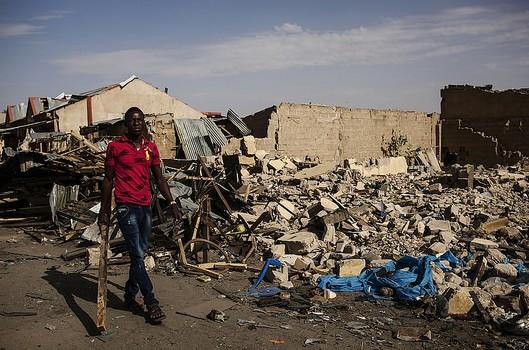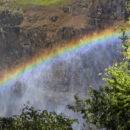Who is Boko Haram’s ‘new leader’?

If it is true that the group has a new leader, that he is who we think he is, and that he’s willing to negotiate, it could be a game changer in the battle against Boko Haram.

According to Chad’s president, Idriss Deby, the Islamist militant group Boko Haram has a new leader. Speaking in a press conference, Deby claimed that the notorious Abubakar Shekau, who has long led the group responsible for tens of thousands of deaths mostly in northern Nigeria, was no longer at the helm.
Instead, the president said that a man named Mahamat Daoud had now taken over and, moreover, was open to dialogue with the Nigerian government.
Where exactly Deby got his information from is unclear, but even if there is truth to it, we should not rush to conclusions. For example, although the announcement that Shekau is no longer in charge has provoked fresh rumours of his demise, it is worth noting that Shekau’s death has been reported and then retracted several times in the past. It is also worth noting that Boko Haram is not a monolithic organisation – there are internal divisions and different groups all labelled as Boko Haram because of their shared origin, and many spokespeople have claimed to speak for the group in the past to little real effect. If the group does have a “˜new leader’, what this would mean is not straightforward.
Nevertheless, there are some questions we can answer.
Firstly, is it true that Shekau has been replaced?
Well, yes, in that he is no longer the sole head of Boko Haram. He now reports to a boss in charge of Islamic State West Africa, who reports to a boss in Syria, who in his turn reports to the so-called Caliph Ibrahim (aka Abu Bakr Al-Baghdadi), the supreme leader of Islamic State.
What is also clear is that not all members of Shekau’s circle were happy about the decision to join Islamic State, and there have been talks of several defectors over the months.
What is less clear is whether Shekau has really now been replaced in his role within Boko Haram – though we can still answer some questions around Deby’s claims, such as: who is this Mahamat Daoud?
If this who I think it is then this news is significant. First of all, his real name is Muhammad Daud. He is said to be about 38 years old and is a Shuwa Arab from Maiduguri with a Kanambu mother from Chad. He is one of the earliest students of Muhammad Yusuf, Boko Haram’s original leader, and is said to have been one of the few amongst the close circle of Yusuf’s students that disagreed with the 2009 Uprising in which the group launched attacks on Nigerian security forces. Daud apparently argued that Boko Haram was not yet strong enough to take over the area.
Daud is also said to be a trader in perfumes and an ex-serviceman, although the particular service he was in is not known by the majority of my sources. He is also one of the scholars of Islamic State of West Africa and is regarded as their Imam of the Science of Hadith. He was said to be a staunch Yusufi, opposing the polarising policies of Shekau after Yusuf’s death in 2009; despite swearing an oath to Shekau, he was one of the few top dogs against the pledge of allegiance made to Islamic State, rejecting it as a betrayal of the teachings of Yusuf.
If Daud really is seeking negotiations, it means he has broken away from Shekau with a faction of men loyal to him. And if he is claiming to have replaced Shekau as the head of the group, it probably means Shekau and his followers are now in Daud’s rifle sights. Daud’s hatred of Shekau may very well surpass his hatred for the Nigerian State.
How does this change anything?
Firstly, Daud is a powerful commander within the group, in charge of Boko Haram’s counter-intelligence and internal security arm known as Amniyah. Before that, he was in charge of the unit responsible for operations in Maiduguri and other major Nigerian cities, meaning he oversaw the training of suicide bombers, the planning of operations in major cities, the selection of targets, and the dispatching of the human weapons to their assigned strike areas. He also ran the group’s intelligence unit and was responsible for collecting the hundreds of millions of naira many state governors were paying the militants to avoid Boko Haram attacking their states.
Daud has a significant support base – I expect hundreds of fighters to follow him if he has left Shekau – and would have tons of information about sleeper cells and operatives of Islamic State West Africa. He could expose the money generation and transfer methods the group uses, reveal critical intelligence about the group’s inner structure, and maybe even offer up information as to how to kill Shekau. If Daud is really seeking negotiations, the Nigerian government should hurry and take the offer as having him on side could well be a game changer.
However, the risk of course is that this is all just a ruse to buy time. And looking back at Boko Haram’s history of behaviour, this possibility cannot and should not be ruled out either.
Fulan Nasrullah is a Nigerian blogger and national security analyst. He blogs at www.fulansitrep.wordpress.com.
A version of this article was originally published at Fulan’s SITREP.
Photograph above of Maiduguri after a Boko Haram attack. By Jordi Bernabeu Farrús.






Check this out: https://www.naij.com/521836-youll-given-everything-need-crush-boko-haram-buhari-military.html – Buhari Vows To Provide Everything Necessary For The Military to crush Boco Haram, and could someone tell me if it is true or not? I need to see which news tell me the true, because I tired to read the humbug in Internet…